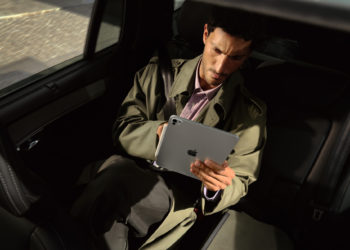Vivienne Westwood, the brand founded by Britain’s queen of punk, opened Riyadh Fashion Week on Thursday, becoming the first international label to present at the Saudi Arabian event, which is now in its third year.
On its face, this was a curious choice for an affair that is the brainchild of an actual royal in a conservative Islamic kingdom where modest dress is mandated. Famously provocative, Ms. Westwood pioneered punk fashion, dressing the Sex Pistols in pins, tatters and lewd graphics in the 1970s, and then built a luxury brand that amplified her left-wing activism before her death in 2022.
This week, the Vivienne Foundation, a charity she founded, rereleased one of her famous early creations, a T-shirt featuring framed female breasts, which was worn by the Sex Pistols guitarist in a notoriously crude 1976 live television interview that scandalized Britain.
It is the kind of garment that might to result in a fine for violating Saudi Arabia’s public decency rules. Over the past decade, the crown prince has led a widespread crackdown on dissent while loosening social restrictions.
But for some Saudi designers, the addition of the rebellious brand to the local lineup was just one more sign of the times, a testament to official efforts to cultivate the kingdom’s cultural allure and nurture a creative scene.
“It’s a way to platform the area,” said Mohammed Khoja, 38, designer and founder of the Saudi brand Hindamme, who will show at Riyadh Fashion Week on Sunday.
With Vivienne Westwood designs kicking off the event, and those of Stella McCartney closing it, Mr. Khoja said that he was thrilled to be in the company of “huge, very respected global brands,” and that he hoped it was the beginning of a new era for Saudi designers.
“Traditionally, banking and petroleum were the main driving economic forces, and creativity was never spotlighted,” Mr. Khoja said of Saudi society. When he started his brand in 2016, “creativity was not necessarily part of the zeitgeist,” he said, although designers like Adnan Akbar and Yahya Al-Bishri had gained acclaim designing for the likes of Princess Diana.
Saudi Arabia’s de facto ruler, Crown Prince Mohammed bin Salman, has in recent years has dramatically relaxed religious restrictions and moved to diversify the economy beyond oil. Investing in business, sports, tourism and culture, as well as hosting major events, are all part of an initiative called Vision 2030. Fashion is part of the picture.
This month, Saudi Arabia created an $80 million fashion fund. Last month, the Ministry of Culture held its first Cultural Investment Conference, focused on “advancing cultural capital,” among other things. In August, the Italian fashion school Istituto Marangoni opened a campus in Riyadh.
Such moves have drawn criticism from human rights groups and public figures, who have argued that Saudi Arabia is trying to deflect attention from domestic repression — and that global participation enables that effort. In recent weeks top comedians, including Marc Maron, have criticized some of their peers, like Dave Chappelle, for participating in the Riyadh Comedy Festival.
News that Vivienne Westwood would show in Riyadh prompted a rebuke from the designer’s granddaughter, Cora Corré, who told The Guardian that the brand’s decision did not align with her grandmother’s values. Ms. Corré broke with the company last year, saying it had strayed from its roots, but continues to work with the Vivienne Foundation charity. She and the foundation did not respond to requests for comment; nor did Vivienne Westwood, the company.
The company has previously said its first show in the Middle East is a way to foster cultural exchange, a framing that others have also used to defend participation in the kingdom’s transformative endeavors.
In Riyadh, Vivienne Westwood showed embroidered gowns made with local artisans from Art of Heritage, an organization that preserves cultural objects and trains Saudi women in traditional crafts. That group is headed by Princess Nourah bint Mohammed Al Faisal, founder of Riyadh Fashion Week, who told Harper’s Bazaar Arabia that the collaboration showed how Saudi craftsmanship can speak to the world.
This echoes the message Mr. Khoja wants to send. His designs are a homage to home and places he has lived, including Texas, where he spent nine childhood years, and Paris, where he studied business administration and fell for fashion. A print in one of his collections depicts petroglyphs from local rock art to highlight “the beginning of visual culture in Arabia,” he said.
Criticism of global participation in the Saudi projects has generated a backlash, too, with some saying that whitewashing accusations are hypocritical and ignore the genuine ambitions of the kingdom’s leadership to diversify its economy and cater to a young, very online population.
“It’s not a monolithic society,” Mr. Khoja said. “There’s creative expression.”
Ephrat Livni is a Times reporter covering breaking news around the world. She is based in Washington.
The post Vivienne Westwood Opens Riyadh Fashion Week, as Saudis Highlight Creative Side appeared first on New York Times.




